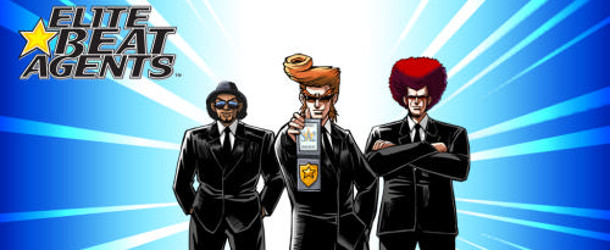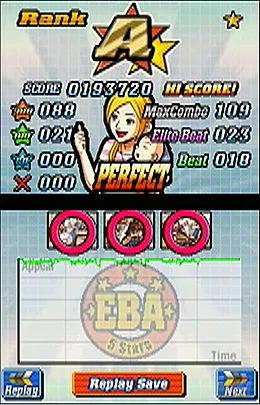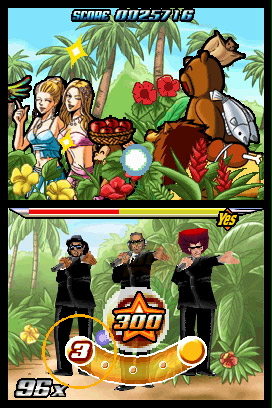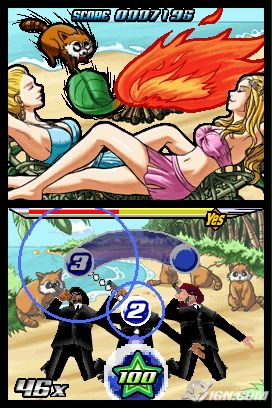This classic GameCola article was originally published in March, 2008.
Now, as my fancy-dancy new bio will explain to you all as soon as you shut the hell up and read it, I am a musician. And, like a good musician, I hate the popular songs that people tend to blast out day in and day out. Let it be known that I don’t care if you’re with a sk8er boi. You’re not a survivor (only some giver), and, if I’m your inspiration, then you must not have much to live for. I hate those songs, and, usually, I would rather bash my head against a wall that’s made from the rust of a collection of spoons from your grandma’s nursing home than listen to them. There’s an exception to the rule, though, as there always is. When I hear any of these songs while playing a quick game of Elite Beat Agents, I will laugh, I will cry, and I will love those songs while playing through one of the greatest games I have ever played.
EBA is actually known by another name in Japan: Osu! Tatakae! Ouendan!. In that game, you play the part of three male cheerleaders, solving people’s problems by dancing to some great J-pop masterpieces that any Naruto-breathing nerds would sing to their graves. In this form, I would put up a barricade of western culture and pray that the bad 12-year-old girl stops singing, as I hate Japanese pop culture for everything that it’s worth.2
Ouendan got high import sales to North America from the people who eat up animated women in short skirts, however. So, Nintendo asked the developer iNiS to go the way of the British colonies and westernize the franchise. The cheerleaders were replaced with secret agents (think Men in Black), and the J was removed from the pop. And the world rejoiced.
The story for EBA is similar to Ouendan’s. People get themselves in a bind, and then scream for help with extreme force in their voices. Then, out of nowhere, three men show up, ask if you’re ready,3 and start dancing to some Sum 41. And you know what the crazy part is? It’s totally awesome. The story is split into 15 chapters. None of them have anything to do with each other until the two-part finale, so each chapter has different characters and places, which is totally fine. The stories range from the normal to the completely bizarre. The first mission has you helping a babysitter trying to balance three kids while trying to ask out the star player of the football team.4
By the end of the game, you’re saving the world from a race of music-hating eyes through the power of song and dance. Every story had me laughing quite loud at some point simply because of how bizarre the game gets on several occasions. It has a ton of heart to it, as well. If you’re not driven to tears during Chicago’s You’re the Inspiration, then your heart is black and devoid of warmth.
Gameplay in EBA takes place entirely on the touch screen. As music plays, it’s up to you to tap circles on the screen to the beat of the song. Sometimes you’ll have to drag the circles around a little bit, and sometimes you have to spin a spinner to get some bonus points. And that’s it. No, really. It’s three things: tap, drag, and spin. And it’s more fun than you’ll ever have with any portable game ever.
Although the premise is simple, it’s challenging to keep yourself on beat in order to keep those Agents dancing. If you keep doing well, the life bar at the top of the screen will say “Yes”, the Agents will keep dancing, and the characters you help will rejoice. If you’re doing a mediocre job, the life bar says “No”, the Agents get tired, and the characters you help run into (hilarious) issues. If you plain ol’ suck, the people you help will fail miserably in their tasks, and the world will shed a single tear for your lack of musical ability. Mind you, once you get on the higher difficulties, the world will laugh at you less.
EBA gets hard fast, and taking on the higher levels will take days and days of failure before you can finally get through that one part of the song that’s been tormenting your soul, only to learn that there’s one more block standing in your way. Then, as you fail, you scream and throw your DS across the room in complete satisfaction. Take it from me, losing in a game sucks. If I keep failing at anything, I’ll likely just toss it aside and never look at it again. But for EBA, it’s the drive to watch the little Agents succeed that drives me to pick up my DS on the bed of roses I throw it to and play through Canned Heat on hard just one more time.
At the end of a song, you’ll be given a letter grade based on how accurate you were in your tapping/spinning/spinning, as well as your final score and max combo. There was never any real explanation as to how the letter grades work, but I’ll be damned if I can ever get anything over a B with a little star on it. The thing that always catches my attention is the little graph they show, explaining how well you were doing and just how quickly you can go from having a perfect game to going deaf in both ears and watching the graph free-fall, then stay in that danger zone for a long, loooong time. Recovering after screwing up is one of the really hard things to do in this really hard game. It can get to the point where one missed beat costs you the song, even though you’ve been hitting them OK for a good while. I know I keep talking about how mind-bending the game gets near the end, but I promise you, it’s all a good thing.
 Oh, good! The devil did keep his end of the bargain!
Oh, good! The devil did keep his end of the bargain!
Graphically, the game is stunning. Comic book art makes up the majority of the game, with 3D renderings of the Agents dancing in the background. Every song starts off with an opening, has several small scenes during the song, followed by the ending part. There’s not exactly full-blown animated cartoons here, but they do what they need to and look beautiful doing it. The art is fully anime-driven, with the giant angry heads, the queer mustaches on the villains, and all the glitter and sparkles that surround every tall, blonde woman that all the guys in the nearest city would roll out the flowers and rings for.5 But you know what? As much as that stuff makes me vomit, it’s OK here. It’s hilarious to watch, and it’s simply a beautiful game to observe—when you’re not losing your head over the constant tapping.
 That bear has eyes, ears and claws only for you, babe.
That bear has eyes, ears and claws only for you, babe.
Music is the biggie in a game like this. (This being a music game. Duh.) The track list, consisting of an odd 19 songs, ranges from classic songs like Deep Purple’s Highway Star and The Stray Cats’ Rock This Town to your ’90s flair with Destiny’s Child’s Survivor, and then your modern stuff like Sum 41’s Makes No Difference and Hoobastank’s Without A Fight. This mix of rock and pop music is certainly welcome, and it’s balanced a lot better than I would have expected from a game like this. All the songs give their own rhythmic challenge to tap your DS out to, but usually it follows the vocal tracks. And while all these songs are covers, they are all good covers. I can assure you that there’s nothing here that will make your ears bleed.6
So, this game has pop music and anime designs. Two things on the “I hate more than life itself” list.7 And yet, I let those by. Does this mean there’s absolutely nothing I can rag on the game over? Well, no. You see, I have this right hand that I play the game with. And the problem with my hand is that, as an organic solid, it is not made of air, and thus I can’t see through it. This is the one real big setback to the game, as too often my vision was obscured by my own body. The game does try to fix this by using arrows to avert your vision to the next item to tap/drag/spin, as well as numbers to identify what to tap next. Most of the time, it’s quite helpful, but there were several occasion where I missed beats due to my lack of invisible hands.
My other beef is that you can’t choose what difficulty to play a song on as soon as you unlock it on one difficulty. My favorite song in the game, Jumping Jack Flash,8 just happens to be the final song in the main game.9 Which means that if I wanted to challenge it on the hard difficulty, I’d need to play all the way through the hard campaign, which I will be able to accomplish once the United States accepts the patent I sent in for my Once-a-Day Hands-Go-Away pills,10 which I should be hearing about shortly. Oh, the game has offline multiplayer and all of that, and you can send ghosts of your best scores of songs to other people, but do people really play portable games’ multiplayer anymore?
 I have eyes, ears and claws only for you, babe.
I have eyes, ears and claws only for you, babe.
Elite Beat Agents is now a year old, at press time11, and I still have not found a more enjoyable experience on my DS. I could wish that the soundtrack was just a bit longer, and I could wish for some online leaderboards and all that fun stuff these yippersnappers take for granted these days. But, who needs wishing for things like this when what I have sitting here in the palm of my hand is the very thing that has lost me long hours of sleep trying to complete September after 256 failed attempts. This is a beautiful and well-designed game that makes me glad that there are cosplaying anime freaks out there to import games like Ouendan, and make them better and more understandable to the superior hemisphere.12
1. Reading Meteo’s reviews and I am America (And So Can You!) has inspired me to write these little foot notes. I’m not copying Meteo, mind you. We’re both copying Stephen Colbert.
2. Not the country, or the customs—just the anime and the music. Don’t be calling me a xenophobe. Though, the whole beer vending machine idea is novel.
3. And, they don’t care if you’re not.
4. Who is a stud.
5. I also enjoy tall, blonde women.
6. I’m looking at YOU, Guitar Hero II’s Beast and the Harlot cover!
7. Numbers 4 and 7, respectfully
8. It’s a gas, gas, gas.
9. Spoiler alert!
10. Not to worry—they aren’t purple.
11. This review was written in 2008.
12. Whichever one America is in.


I wouldn’t copy Stephen Colbert if my name was Bill Maher so help me God! That man is a radioactive turd on 3 legs.